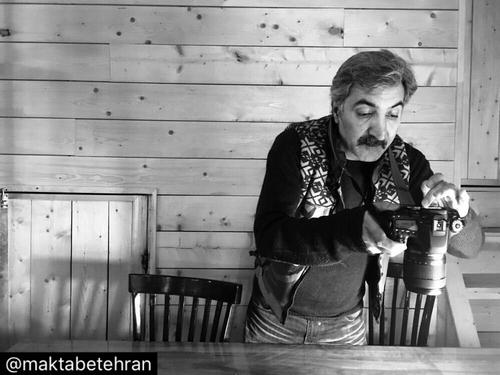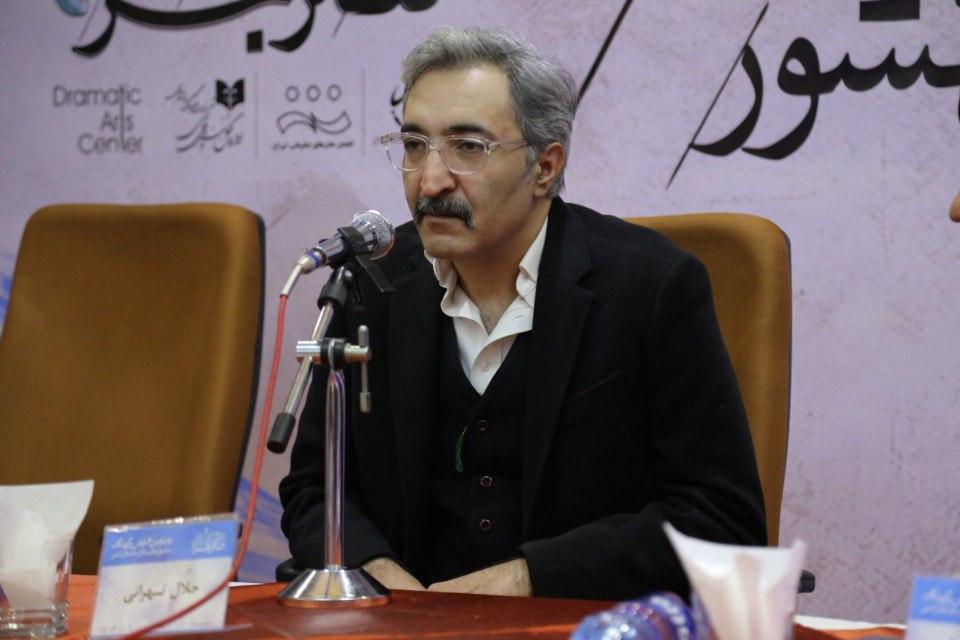Reza Ashofteh
Third of August is Jalal Tehrani's birthday. A bizzare artist whose bizzareness is because of his special perception of art. He doesn't create same as the others. He creates the way that is exclusive and unique for himself and it is the first time that we see or read those pieces. His point of view around the issues is wide and thaughtful.
His language reminds us challanging the words. His characters are sorrowful but not screaming. They exist to speak indirectly on behalf of the people of the world in order to cure the sores.
Jalal Tehrani is into taking risks, he doesn't have any assertion though. He is always changing and evolving. We will never meet him in two similar and near forms. He is willing to change his forms permanently.
Jalal Tehrani uses his ingenuity and thoughts to talk about some things that are happening for the first time. He is trying wisely, inteligently and modestly among these creativity circles, to discover the self. Oneself who talks about an unknown world and in decoding the universe takes over other persian artists. We don't even have anyone like him in the world because he has created his special pieces. Although we will categorize his pieces among Absurd or Neo-expressionism or Surrealism or even Post modernism. Tehrani brings himself on the stage. He has his own style and willing to demonstrate his discoveries on the stage, that's why form is really important for him. He is also trying to involve his audience with the content, but from new points of view. He is neither content-based nor contentless. He prefers indirect speaking to shouting his speeches. He is a playwright and director who says his loud speeches with a quiet voice. He likes everyone sitting and wondering the aesthetic of his work. The audience really wonders the scene, light design, music, acting style and the way of expressing the dialogues. The way he writes dialogue, not many writers could have ever done. He plays strange games with the words. The music of the words is sometimes exciting and sometimes down and going silent and sometimes is like a poem. He doesn't want to waste his abilties for easy to reach ideas. He tries to go through an unknown world which can impress the audience and increase the novelty of his works. He avoids the stereotypes. Unwantedly the atmosphere of his works is a combination of different and various worlds. His locations are not predictable too. The pyramids of Egypt in "Nefertiti", petrol station in "The tank" and ghost house in " Hey big man don't cry" are the samples of uncommon locations in persian literature.
discover the self. Oneself who talks about an unknown world and in decoding the universe takes over other persian artists. We don't even have anyone like him in the world because he has created his special pieces. Although we will categorize his pieces among Absurd or Neo-expressionism or Surrealism or even Post modernism. Tehrani brings himself on the stage. He has his own style and willing to demonstrate his discoveries on the stage, that's why form is really important for him. He is also trying to involve his audience with the content, but from new points of view. He is neither content-based nor contentless. He prefers indirect speaking to shouting his speeches. He is a playwright and director who says his loud speeches with a quiet voice. He likes everyone sitting and wondering the aesthetic of his work. The audience really wonders the scene, light design, music, acting style and the way of expressing the dialogues. The way he writes dialogue, not many writers could have ever done. He plays strange games with the words. The music of the words is sometimes exciting and sometimes down and going silent and sometimes is like a poem. He doesn't want to waste his abilties for easy to reach ideas. He tries to go through an unknown world which can impress the audience and increase the novelty of his works. He avoids the stereotypes. Unwantedly the atmosphere of his works is a combination of different and various worlds. His locations are not predictable too. The pyramids of Egypt in "Nefertiti", petrol station in "The tank" and ghost house in " Hey big man don't cry" are the samples of uncommon locations in persian literature.
For discovering him you should be so careful. He is an artist who invites the audience to think about his works for many times. He likes to have his audience enjoy discovering different layers of the work.
Jalal Tehrani used to write as a theater critic at first, but after that play writing became serious for him and just focused on writing and directing.
"Nefertiti"
"Nefertiti" was the first stage performance of Jalal Tehrani as a director in 2002 in Kuchak Salon of City Theater. You just need to search for the word "Nifertiti" to know that Nifertit was the Great Royal Wife of Pharaoh Akhenaten. "Nefertiti" and her husband were known for a religious revolution, in which they worshipped one God only. Nefertiti is also known for her beauty in the Egypt history. Actually the story of this play takes place based on Hassan Moghadam's life and Jafar Khan is back from Europe in the Egypt pyramids. Here we find the writer's ingenuity cause he puts the characters in unfamiliar situations.
 "The Tank"
"The Tank"
Jalal Tehrani wrote the play "Tank" in 1998. This play was one the pieces that he used to write for the radio. He started its rehearsal in 2001 and the play was operated in 2002 but this play was simultaniously performed along with "Nefertiti" so his group had to go from one salon to another with keeping their make up. This pressure would reduce the quality of both operations. After that we were waiting for the "Tank" and he was looking forward to a situation to perform it. In 2010 this situation was provided and the "Tank" went on the stage. Tehrani about his attention to the social issues and the problems like murder and violence claims that; "since the age of twenty, I used to follow the Incident News but I quitted this habit soon. While writing I don't get ideas from my surounding. I just leave it to my uncontious mind and I just think of the structure of the play. "The Tank" starts with a dialogue same as my other works. I chose a sentence and decided to write a play full of anxiety. It is also clear that the happenings of the society would influence the writer."
"The Tank" is a story of murdur in a family. Two brothers kill their step brother and sister to get a revenge of their mother who had been self burnt. The father is trying to stop these brothers and they will kill their step mother in advance.
"Single Cells"
"Single Cells" was operated in 2003 and expresses the situation of three pairs of people. The situation of two prisoners named Piri and Lari. A philosopher and a boy named Salar and Salem and two laboratory experts named Farmandeh and Farkhondeh. Their relationships can be inspired by any kinds of human relationships.
"Hey big man don't cry!"pl
"Hey big man don't cry" story was apart from other Jalal Tehrani's works and it was complimentary work of him. This play was taking place in a vertical surface. Many ghosts were living in a house and it was all the story; in fact it wasn't the all. It's the feeling that audience takes away after the play and it's a feature of Tehrani.
"Listen to the sound of earth"
This play which was operated in 2010 can be categorized in post modern works because it's a theater of multiple voices and we hear different, opposite, symmetrical and paradoxical voices. In fact the essence of the world is made out of these voices. In the today world these voices are providing the possiblities for living together. During this play five poets named Muhamad Ali Sepanlu, Muhamad Reza Aslani, Ali Baba chahi, Zia Movahed and Maftun Amini read poems like the radio recordings. Poems with different languages and atmospheres to make the play multiple voice.
Actors are narrators of a story and break the stoy to say that is possible to tell the stories from different views.
"Cinderella"
Jalal Tehrani:" I wrote the play of "Cinderella" in 2008 and it's an ordinary woman's story. Based on the gossips this woman turns into Cinderella. People gossip that she is Cinderella because her shoes were left in a Colonel's room. This gossip makes this woman Cinderella. It's talking about a society that everyone lives in the virtual world. They know answer of everything but the answers are gossip. They never ask a question and you can't find a question sentence in this piece."
Jalal Tehrani was born in 1968 in Tehran. Before play writing he used to have industrial works, electronic design, but after that he entered the university for studying Dramatic Literature. He began his stage experiences in 2001 with operating "Nefertiti", "The Tank", "Single Cells", "Hey big man, don't cry!" and "Professor Position" then he made a name as a talented young writer. But now he is passing his middle-age period. Let's put aside the plays that he has designed their stage or light. Maybe he himself can't remember some of them. This point is only mentioned to say that stage and light design in Tehrani's works play significant roles and it comes from his personal experiences.
Tehrani has travelled to Sweden, Germany France and has learnt different things from their academies. Then he spent one year for scenario writing. Scenarios like "It rains in the hell", "Finished Story" and "Merci" are for that period. The film of "Merci" was produced and played in the festival of Toronto. Tehrani keeps his astonished point of in his scenarios too. "Merci" is a story of a genie who comes to Tehran to fulfill an old man's wish but the old man does not have any wishes.
In the field of education and publication Tehrani has also founded Tehran School to have the young students learn and practice theater and improve themselves.


